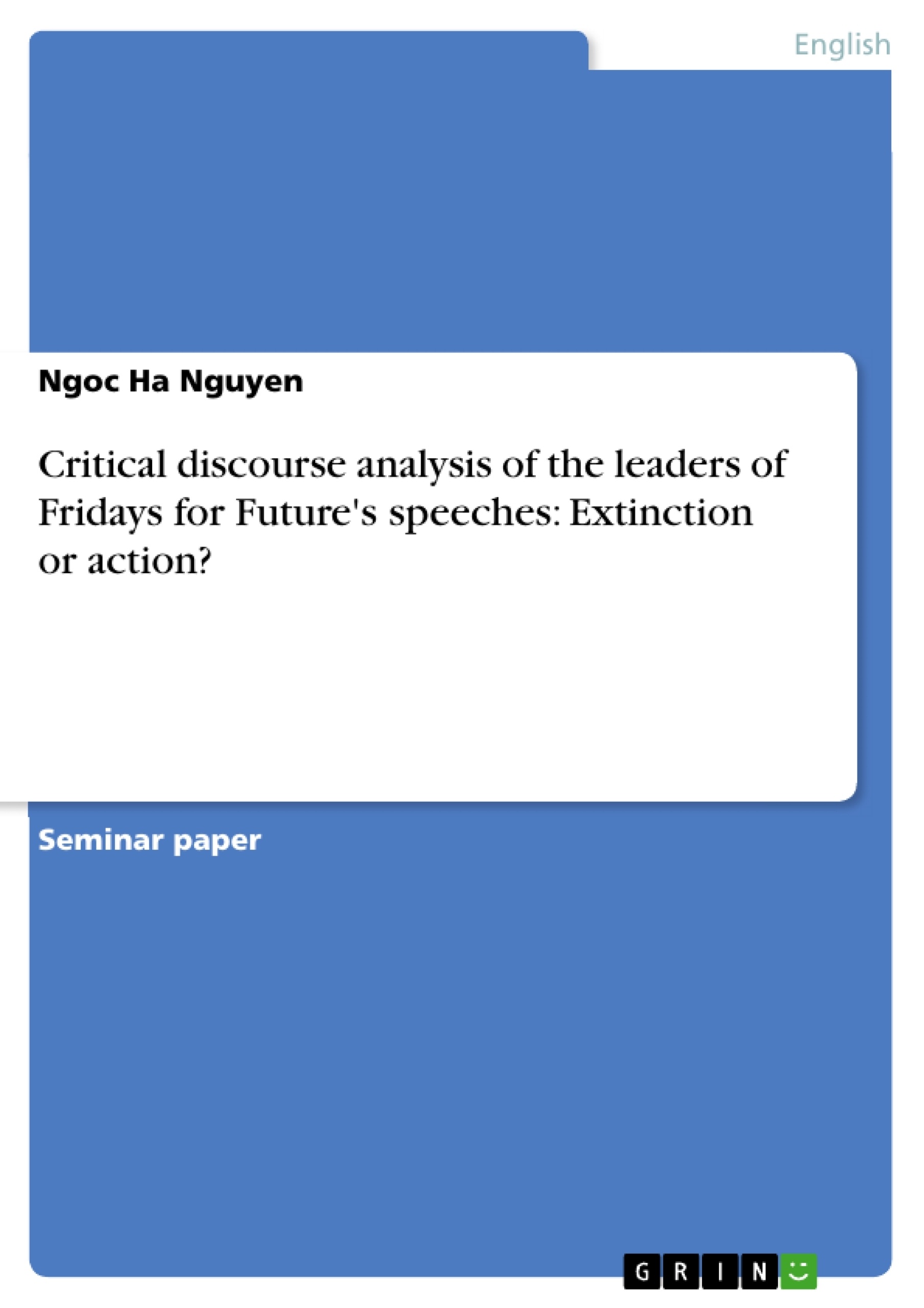This paper analyzes the discursive strategies employed by the leaders of Fridays for Future movement to effectively convey their messages and shape the audience's perceptions within the broader climate change discourse.
Climate change has been a significant subject, especially in recent years when its consequences are getting worse e.g. the global temperature is always breaking record. However, there exist various perspectives regarding climate change, such as resistance to change or active advocacy for environmental preservation. In this scenario, the significance of climate activists is growing. When talking about climate activists, the leaders of the Fridays for Future (FFF) movement, Greta Thunberg and Luisa Neuerbau, must be mentioned. This movement has gained substantial recognition and mobilized millions of individuals across the globe to demand urgent action on climate change. One of the ways they mobilize is through speeches, so how they use language as well as discursive strategies is one important factor in persuading the audience and showing their ideology. However, as far as I researched, there is no paper talking about the use of discursive strategies in their speeches.
Inhaltsverzeichnis (Table of Contents)
- Introduction
- Theoretical considerations
- Methodology
- The analysis of the discursive strategies in the speeches
- Macro-analysis
- Micro-analysis
- Nomination strategies
- Predication strategies
- Argumentation strategies
- Perspectivization strategies
- Intensification/ mitigation strategies
- Conclusion
Zielsetzung und Themenschwerpunkte (Objectives and Key Themes)
This paper explores the discursive strategies employed by Greta Thunberg and Luisa Neubauer, prominent leaders of the Fridays for Future (FFF) movement, in their speeches. The primary objective is to analyze how these strategies contribute to the conveyance of their opinions and the persuasion of their audience. The research analyzes two specific speeches: "The disarming case to act right now on climate change" and "Why you should be a climate activist." The paper utilizes Critical Discourse Analysis (CDA) framework to examine the language used in the speeches, examining both the societal implications on the macro-level and the linguistic elements on the micro-level.
- Discursive strategies in climate change activism
- The influence of language and communication on social power structures
- The role of media in shaping political discourse
- Persuasion techniques and rhetorical devices in political speeches
- The impact of climate change activism on public awareness and policy
Zusammenfassung der Kapitel (Chapter Summaries)
The introduction of the paper sets the context for the research by discussing the significance of climate change and the growing role of climate activists. It specifically focuses on the FFF movement and the importance of analyzing the discursive strategies employed by its leaders. The paper also outlines its main objective and research question.
The second chapter provides a theoretical framework for the analysis, defining the concepts of discourse and Critical Discourse Analysis (CDA). It highlights the importance of analyzing language and communication in social and political contexts to uncover underlying power structures and ideologies.
The third chapter details the methodology used in the analysis. It explains the chosen approach within the CDA framework and outlines the steps involved in analyzing the selected speeches. This chapter also discusses the data used in the study, which consists of two specific speeches by Greta Thunberg and Luisa Neubauer.
The fourth chapter delves into the analysis of the discursive strategies employed in the speeches. It begins with a macro-analysis, examining the broader context and potential political significance of the speeches, particularly considering the media platform on which they were delivered. This section is followed by a micro-analysis, which focuses on specific discursive strategies such as nomination, predication, argumentation, perspectivization, and intensification/mitigation.
Schlüsselwörter (Keywords)
The main keywords and focus topics of the text are: Critical Discourse Analysis (CDA), Fridays for Future (FFF), climate change activism, discursive strategies, nomination, predication, argumentation, perspectivization, intensification/mitigation, Greta Thunberg, Luisa Neubauer, TED Talks, media influence, political discourse, social power, persuasion techniques, rhetorical devices.
- Arbeit zitieren
- Ngoc Ha Nguyen (Autor:in), 2024, Critical discourse analysis of the leaders of Fridays for Future's speeches: Extinction or action?, München, GRIN Verlag, https://www.grin.com/document/1496771



